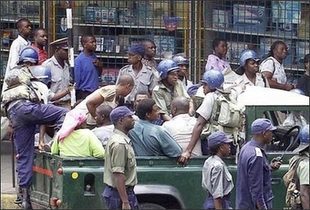
This report documents human rights violations experienced by female, male and transgender sex workers in four African countries (Kenya, Uganda, South Africa and Zimbabwe), and describes barriers they face to accessing health services. Through cross-country comparison and documenting sub-regional trends, the study moves beyond previous often-localised descriptions of violations against sex workers in Africa. The study also fills information gaps about violations in male and transgender sex workers in this setting.
Delegates from the African Sex Worker Alliance (ASWA) and a church leader from Nigeria gathered in Pretoria from the 28th September to 10th October for a second historic meeting as a follow up to the first ever African sex worker lead conference in February 2009.
Why do women engage in transactional sex? While much of the explanation is that sex-for-money pays more than other jobs, we use a unique panel data set constructed from 192 self-reported diaries of sex workers in Western Kenya to show that women who supply transactional sex develop relationships with regular clients, and that these clients send transfers in response to negative income shocks.
Article in AIDS Educ Prev 2011 Aug;23(4):299-312.

Kenyans, drawn from the gay and lesbian community, male and female sex workers, representatives of the police force, health care providers and also legal professionals came together to mark the International Day Against Homophobia and Transphobia (IDAHO)in Kisumu, Kenya.
Previous research has linked alcohol use with an increased number of sexual partners, inconsistent condom use and a raised incidence of sexually transmitted infections (STIs).
Multiple intravaginal HIV prevention methods, including microbicide gels, barriers and intravaginal rings, are in clinical development in Africa.
Article in the European Journal of Contraception and Reproductive Health Care, June 2011, Vol. 16, No. 3 , Pages 173-182.
Female sex workers (FSWs) are thought to be at heightened risk for unintended pregnancy, although sexual and reproductive health interventions reaching these populations are typically focused on the increased risk of sexually transmitted infections. The objective of this study of FSWs in Kenya is to document patterns of contraceptive use and unmet need for contraception.
Few studies in Africa provide detailed descriptions of the vulnerabilities of female sex workers (FSW) to sexual and physical violence, and how this impacts on their HIV risk. This qualitative study documents FSW’s experiences of violence in Mombasa and Naivasha, Kenya. Eighty-one FSW who obtained clients from the streets, transportation depots, taverns, discos and residential areas were recruited through local sex workers trained as peer counsellors to participate in eight focus-group discussions.
Kenyan sex workers, drawn from different cities, converged at Tononoka Social Hall in the Coastal town of Mombasa to celebrate the March 3rd International Sex Workers Rights Day. This day is celebrated since 2001 when over 25,000 sex workers gathered in India for a sex worker festival. It has been designated to highlight the human rights challenges, success and failures facing sex workers.

